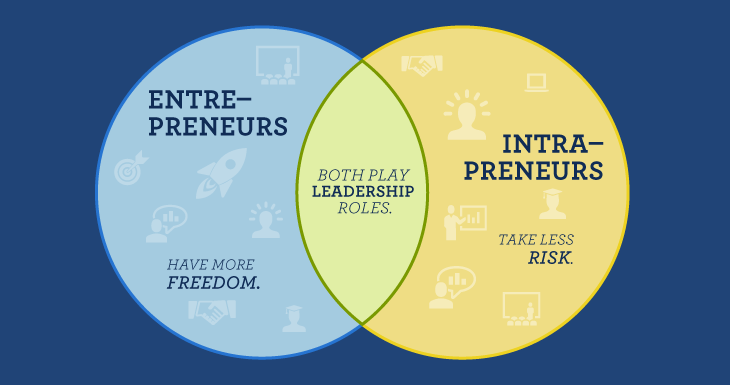
The term “intrapreneur” first appeared in the 1980s when management consultants Gifford and Elizabeth Pinchot published Intrapreneuring: Why You Don’t Have to Leave the Corporation to Become an Entrepreneur. In this book, they defined intrapreneurs as “dreamers who do. Those who take a hands-on responsibility for creating innovation of any kind, within a business.”
Though the term has been part of the business world for decades, there is still some confusion about how intrapreneurship relates to entrepreneurship, and vice versa. While the two terms are different, there are similarities and advantages to both approaches in practice.
What Is an Intrapreneur?
The central difference between entrepreneurs and intrapreneurs is the setting in which they work. “An intrapreneur is an inside entrepreneur, or an entrepreneur within a large firm, who uses entrepreneurial skills without incurring the risks associated with those activities,” Investopedia explains.
In many cases, intrapreneurs are able to work on a special project that fosters innovation within their organization. Another key difference is that intrapreneurs don’t take on as much risk as entrepreneurs because they work within a company rather than leading ventures on their own.
According to Investopedia, “An entrepreneur is an individual who, rather than working as an employee, runs a small business and assumes all the risks and rewards of a given business venture, idea, or good or service offered for sale.” Intrapreneurs often use entrepreneurial skills to launch a new project or initiative within their organization.
Shared Traits of Entrepreneurs and Intrapreneurs
Despite their differences, the drive to innovate is something entrepreneurs and intrapreneurs share. They tend to have certain traits in common, such as the following:
- Leadership: One of the most important characteristics of successful intrapreneurs and entrepreneurs is strong leadership skills. A key part of success is being able to get others onboard by motivating them to achieve a shared goal. Creative management and diverse approaches to leadership are typical among both entrepreneurs and intrapreneurs.
- Intelligence and vision: Intelligence can mean having the right skill sets and tools to complete a project, while vision refers to recognizing trends and capitalizing on emerging opportunities. Successful entrepreneurs and intrapreneurs are able to balance passion and innovation with business acumen.
- Adaptability: Both intrapreneurs and entrepreneurs are able to shift direction quickly when problems and challenges arise. Even the most promising plans and strategies can encounter roadblocks. However, adaptability means responding effectively to any situation. Making decisions to “navigate you out of trouble and allow you to thrive in environments that would sink those that aren’t adaptable” is what makes these professionals stand out, Entrepreneur says.
Entrepreneur vs Intrapreneur: Advantages
For intrapreneurs, working within an existing framework offers many advantages. One of the main benefits is that their organization is able to provide them with the resources they need. This can include human resources, a legal team, and financial oversight.
In addition, intrapreneurship enables professionals to utilize funding from their existing organization. There’s no need to raise capital once the project is greenlit. Intrapreneurs also have access to mentors. They are able to learn from supervisors and others within the company and utilize them as a valuable resource.
Entrepreneurship may offer more freedom because entrepreneurs are able to determine work culture, schedule, and even dress code for their business. They also have the agency to make final decisions and effect change at a high level. Though entrepreneurs take on more risk, they stand to gain the most if their venture is successful.
Graduate Business Education at King University
Whether you are looking to advance your career through entrepreneurship or intrapreneurship, the right education can put you on the path to success. King University offers a fully online MBA that prepares students for leadership positions in a variety of settings. Specializations are available in the following areas:
- Accounting
- Finance
- Healthcare Management
- Human Resource Management
- Management
- Marketing
- Leadership
- Project Management
In this program, you will learn advanced business skills related to management, decision-making, communication, and more, along with specialized coursework that prepares you with the skills you need no matter what your career goals are. Find out where an MBA from King University can take you today.